The Monopoly jail rules are some of the most confusing in the game. That’s why you’re here, right?
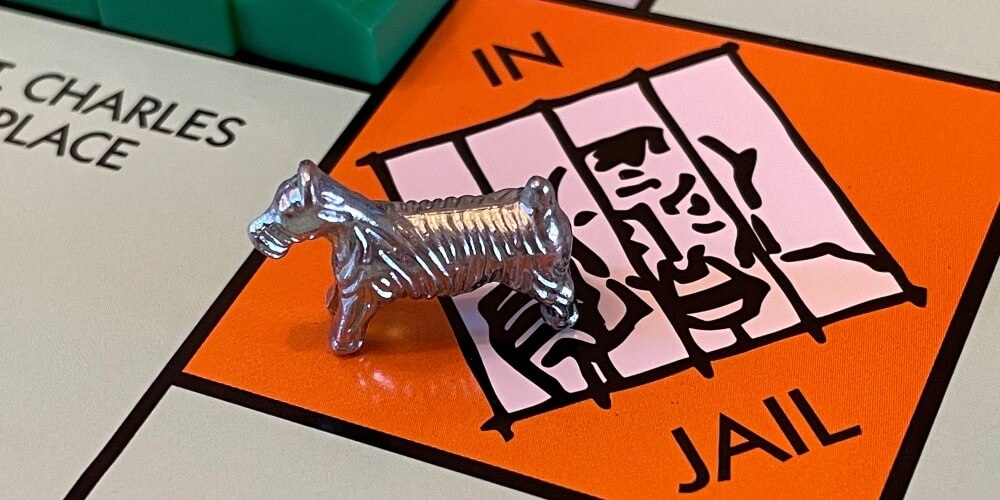
To clear up any doubts, this article explains the official Monopoly jail rules including:
- When you must go to jail
- What happens in jail
- How to get out
I’ve also listed some unofficial ‘house rules’ that you can try if you fancy a change the next time you play.
Here’s a photo of the official Monopoly Jail Rules that comes in the box…
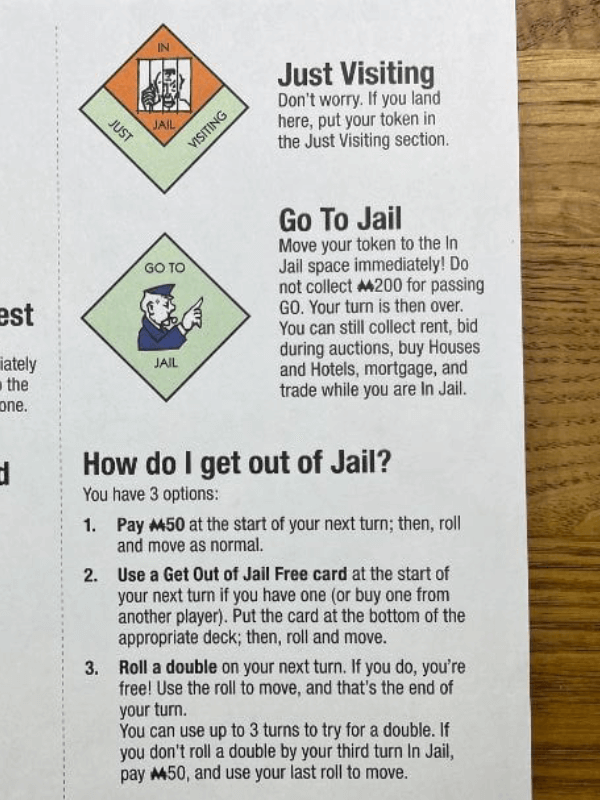
Even with this, you may still have some questions, so read on as I explain everything as concisely as possible…
How do players end up in jail in Monopoly?
There are three ways you could end up in jail in Monopoly:
- You land on the ‘Go To Jail’ space
- You draw a Chance or Community Chest card that tells you to go to jail
- You roll doubles three times in a row
When you land on the jail space, you are not in jail – you’re ‘just visiting’ and should place your token to the side of the space.
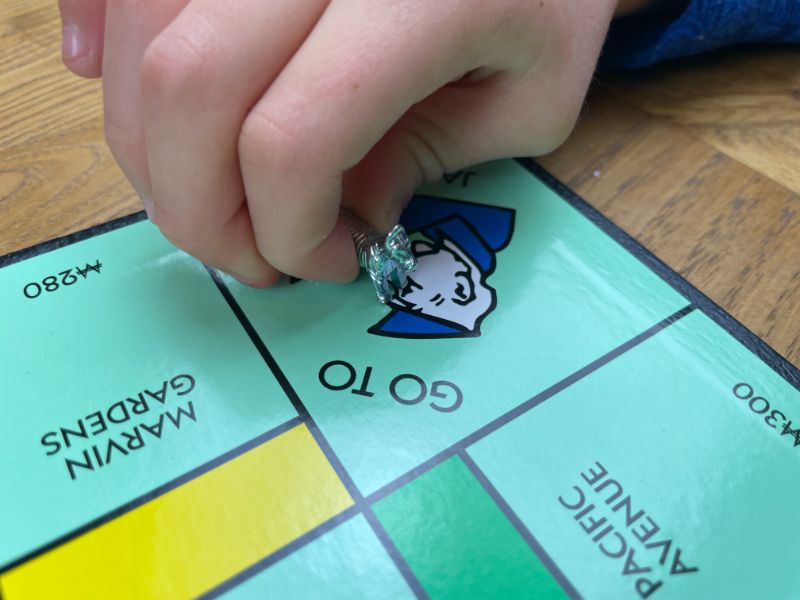
What happens when you go to jail in Monopoly?
When are sent to Jail in Monopoly, you must go straight there. This means moving across the board, not passing Go, and not collecting $200. Your turn ends when you are sent to jail.
If you rolled three doubles to end up in jail, you do not move according to your third roll, but instead, you must go straight to jail.
As your turn ends straight away, this means that you cannot initiate any trades or buy houses until your next turn.
Can you collect money while in jail in Monopoly?
When you are in jail in Monopoly, you can still collect any rent or any other money that you are owed. You can also still build or sell houses and hotels, buy or mortgage property, participate in auctions and deal with other players.
In Jail you can:
-
Collect Rent
-
Buy Houses
-
Sell Houses
-
Buy Property
-
Mortgage Property
-
Trade
-
Participate in Auctions
The only thing that you can’t do in jail is move your token.
Read more: What can you still do in Monopoly jail?
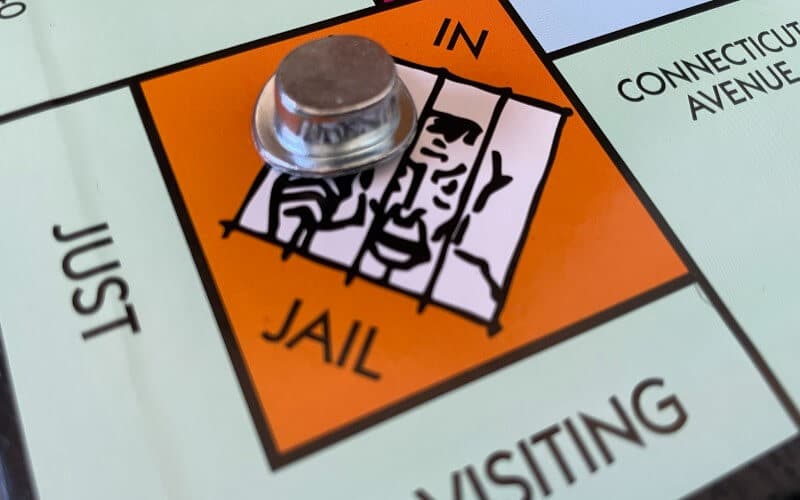
How do you get out of jail in Monopoly?
There are three ways to get out of jail in Monopoly:
- Pay a $50 fine
- Use a ‘Get Out of Jail Free’ card
- Roll doubles
1. How to pay a fine to get out of jail
After you have been sent to jail and everyone else has had a turn, you may then choose to pay $50 to get out.
Pay the fine to the bank first, then roll and move the number of spaces indicated on the dice.
Note: Never put fines in the centre of the board, they should always go to the bank.
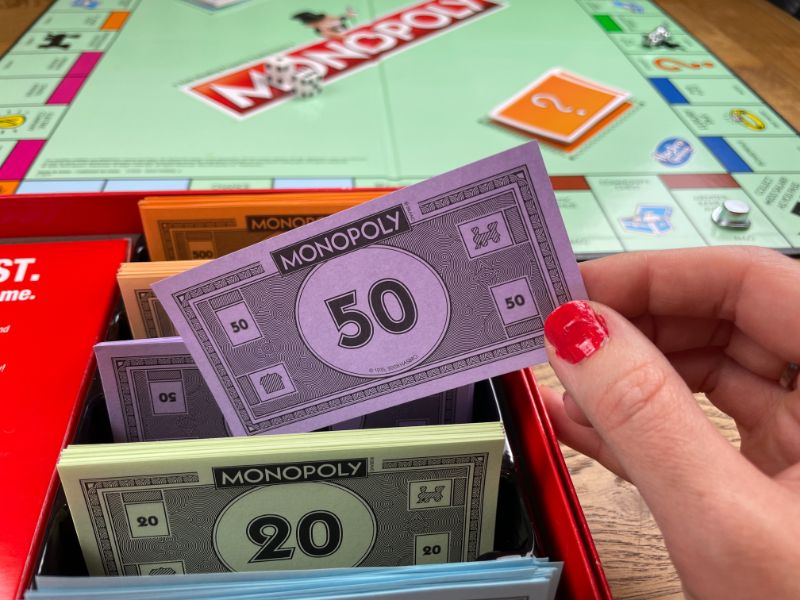
2. How to play your ‘Get Out of Jail Free’ card
There are two ‘Get Out of Jail Free’ cards in Monopoly – one is a Chance card and the other is a Community Chest card.
You may be lucky enough to pick up a Get Out of Jail Free card and keep it until you need it. But of not, you may also have the option to buy one from another player for a price that you both agree on.
To use a Get Out of Jail Free card:
- Say that you are playing a Get Out if Jail Free card.
- Place it at the bottom of the Chance or Community Chest pile
- Roll the dice
- Move your token
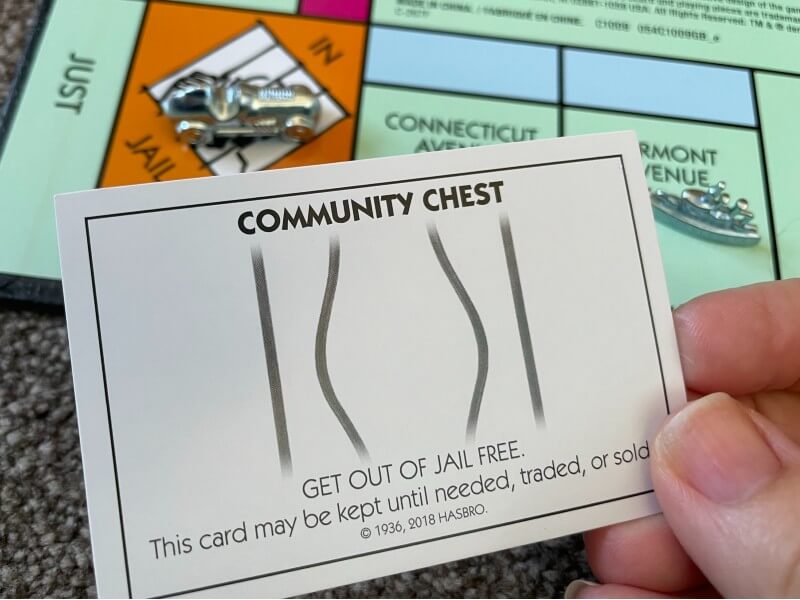
3. If you rolling doubles while in jail
If you roll a double while in jail you are suddenly free from jail and can move the number shown on the dice.
However, you cannot roll again as you would normally do when rolling doubles. Your turn ends after you move.
You have a maximum of three tries to roll a double – one try on each turn.
If you do not roll a double on your third attempt, you must either use a Get Out of Jail Free’ card or pay the $50 fine. You then move the number shown on the dice in your failed attempt to roll doubles (don’t roll again).
Have any more questions about getting out of jail? Read the full guide here: How To Get Out of Jail In Monopoly.
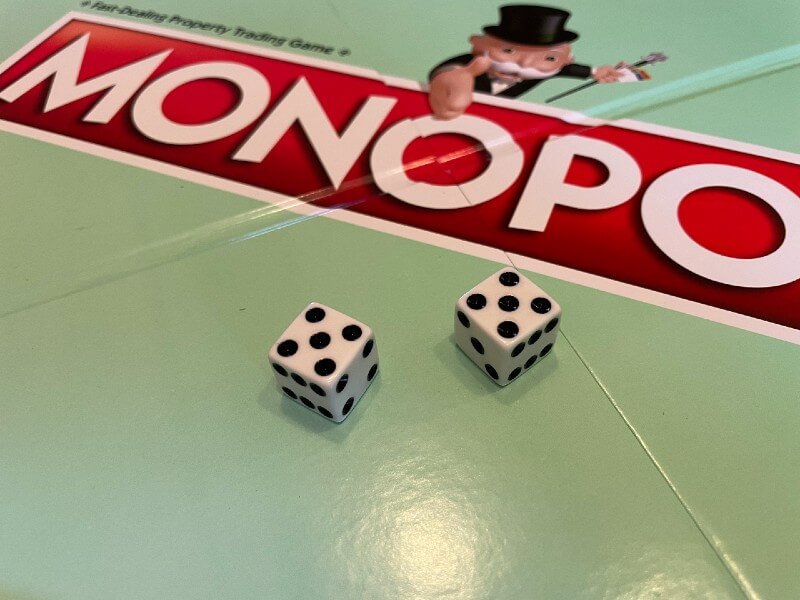
What if you cannot pay to get out of jail?
If, after three rolls, you don’t have $50 cash to pay to get out of jail and don’t have a ‘Get Out of Jail Free’ card, you must raise the funds to get out of jail.
You can do this by mortgaging property, selling houses or trading with another player.
Check out these guides for more information on how to do that.
If you are still unable to raise money with these methods, you are bankrupt and out of the game.
In that case, you’ll want to read this guide to what happens to your assets when you’re bankrupt.
If you go bankrupt but there are still two or more players in the game, they will continue without you until the game ends.
Should you pay to get out of jail or not?
Whether or not it is wise to pay to get out of Monopoly jail or to stay in for as long as possible depends on the stage of the game. Being in jail can be a bad thing or a good thing.
So, let’s take a look at the best jail strategies…
Early in the game – You want to buy as many properties as possible to build your portfolio. At this stage, you should get out of jail as soon as possible, or risk others snapping up the properties that you want to buy.
Later in the game – When most of the properties are owned, moving around the board becomes riskier. This is especially true if the other players have houses and hotels that you may land on.
Staying in jail can be a good way to avoid landing on other players’ properties, while still collecting rent when people land on yours.
However, you cannot stay in jail forever. You must always leave if you roll doubles or after three failed attempts to roll doubles.
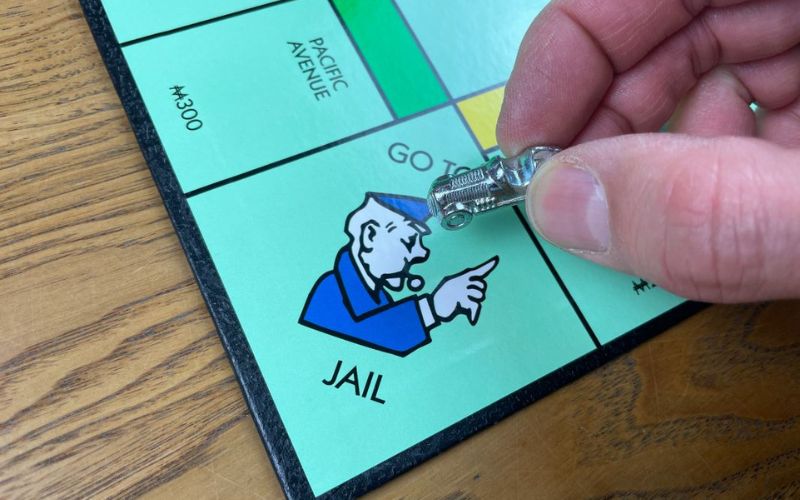
Personally, I find it really boring and frustrating to be in jail, so I rarely stay in there for the full three rolls, unless I’m really scared about landing on someone’s hotels or I’m super short on cash!
8 Fun Alternative Monopoly Jail Rules
There are various ‘house rules’ which people may opt to use when they play Monopoly.
Giving some of these a go can be a fun way to spice up your game. You’ll just need to make sure that everyone is aware of the new rules before you start.
1. Short game rule
To make the game of Monopoly quicker, you can make it so that you must leave jail on your first turn.
So, if you fail to roll doubles, you must then pay the fine or use a ‘Get Out of Jail Free’ card to leave jail straight away.
2. Frozen assets rule
According to this unofficial jail rule, when a player is in jail they cannot collect any rent from other players.
3. Jail defender rule
This unofficial Monopoly rule states that when a player goes to jail, they much pay every other player $100. Double ouch!
4. Free jail rule
According to this rule, when someone goes to jail, all of the other players must chip in to pay for it.
So in a six-player game, each player would give the person $10 to cover their jail fee.
5. Jail ends all rule
This rule is a bit silly, but good if you like a short game. When a player land in jail, they are bankrupt and out of the game.
6. Jail auction rule
The jail auction rule states that when a player goes to jail, they must choose one of their properties to put up for auction.
7. Half rent rule
To discourage players from staying in jail, you could add a rule to collect only half of the rent that is due when you are in jail.
8. Cheaters go to jail
The Monopoly rules don’t state what happens if you are caught cheating, but some players have a rule that cheaters must go to jail, stay there for three turns and then pay double to get out.
Suggested read: How to Cheat at Monopoly Without Getting Caught
The Bottom Line
The official Monopoly jail rules are complex and confusing, with some intricacies over what you can do and when.
This is further confused by several unofficial Monopoly rules which people may confuse for the real rules.
At the end of the day, if everyone agrees to play by the same rules, you’re good to go. Unless agreed at the start, you should play according to the official Monopoly jail rules which are explained here.
Monopoly Jail FAQs
In Monopoly, the fine to get out of jail is always $50. Alternatively, the player can use a ‘Get Out of Jail Free’ card if they have one, or roll doubles.
In Monopoly, you always stay in jail at least until your next turn. You can get out immediately, while the maximum time that you can stay in jail is three turns.
In Monopoly, there is no such thing as ‘bail’. However, if you are sent to jail, you can pay a fine of $50 to get out. Alternatively, you can use a ‘Get Out Of Jail Free’ card or roll a double.

